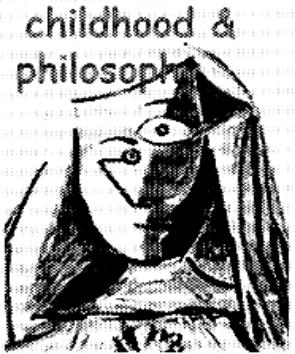improvising in the community of philosophical inquiry: a way to learn to inhabit uncertainty
DOI:
https://doi.org/10.12957/childphilo.2025.89428Keywords:
uncertainty, improvisation, community of philosophical inquiry, philosophy for children, collective performanceAbstract
This theoretical contribution proposes an open reflection on uncertainty, present in contemporary social and educational discussions, and on the value that learning to inhabit such “uncertainties” can have for the well-being of individuals and communities. Perceiving different alternatives before making a choice, finding yourself lost when faced with the ambiguity of some information, and feeling disorientated when faced with complexity, are all characteristics of this elusive “uncertainty” (Barreneche & Santi, 2022). Uncertainty can be perceived negatively if it provokes fear, worry, anxiety, perception of vulnerability (Hillen et al., 2017) or in a constructive way if it appears as a vital engine for research (Tauritz, 2019). Community of philosophical inquiry (CPI) – as conceptualized and promoted in the Philosophy for Children (P4C) curriculum - becomes a “safe creativity environment” (Weinstein, 2016), in which to learn to inhabit uncertainty. A CPI that improvises (Zorzi & Santi, 2023), develops and makes conscious dispositions towards uncertainty, learning to see alternatives as a resource, ambiguities as creative horizons of meaning, and complexity as a collective performance to be experienced. Six improvisational dimensions – (1) respecting diversities, (2) trusting possibilities, (3) building a sense of community, (4) opening attitude towards changes, (5) explorative attitude, (6) creative passion, emerged from other previous researches (Zorzi, Camedda, Santi, 2019), are proposed to orient facilitators’ and CoI's training, dialoguing with the “nine recurring moments of disequilibrium” suggested by Karin Murris (2008).
Downloads
References
Alterhaug, B. (2010). Improvisation as Phenomenon and Tool for Communication, Interactive Action and Learning. In M. Santi (Ed.). Improvisation between Technique and Spontaneity. Newcastle upon Tyne: Cambridge Scholars; pp. 103-133.
Babrow, A.S. (1992). Communication and Problematic Integration: Understanding Diverging Probability and Value, Ambiguity, Ambivalence, and Impossibility, Communication Theory, Volume 2, Issue 2, May 1992; pp. 95–130, https://doi.org/10.1111/j.1468-2885.1992.tb00031.x
Barreneche, M., Santi, M. (2022). Philosophy for Children: una pratica del (dis)orientamento in comunità di indagine. Studium Educationis; XXIII; pp. 160-170.
Barrett, F. (2013). Disordine armonico: leadership e jazz. Milano: EGEA.
Brashers, D.E. (2001). Communication and uncertainty management. Journal of Communication, 51, pp. 477-497.
Brookfield, S.D. (2006). The Skillfull Teacher. San Francisco: Jossey-Bass.
Felsman, P., Gunawardenac, S., Seifertc, C.M. (2020). Improv experience promotes divergent thinking, uncertainty tolerance, and affective well-being. Thinking Skills and Creativity, vol. 35, pp. 1-14.
Freire, P. (2014). Pedagogia dell’autonomia: saperi necessari per la pratica educativa. Torino: Gruppo Abele.
Gershenson, C. (2013). Facing Complexity: Prediction VS Adaptation. In A. Massip-Bonet, A. Bastardas-Boada (Eds.). Complexity Perspectives on Language, Communication and Society. Understanding Complex System. Berlin, Heidelberg: Springer; pp. 3-14.
Haynes, J. (2008). Children as Philosophers. Learning through Enquiry and Dialogue in the Primary School, 2nd edn. London, Routledge.
Hillen, M.A, Gutheil, C. M., Strout, T.D., Smets, E.M.A., Han, P.K.J. (2017). Tolerance of uncertainty: Conceptual analysis, integrative model, and implications for healthcare. Social Science & Medicine (180); pp. 62-75.
Kizel, A. (2021). The facilitator as self-liberator and enabler: ethical responsibility in communities of philosophical inquiry. Childhood & philosophy, n.17; pp.1–20.
Kohan, W. O. (2014). La filosofia come paradosso. Apprendere e insegnare a partire da Socrate. Roma: Aracne.
Mead, G.H. (1934). Mind, self & society: from the standpoint of a social behaviorist. Chicago, Ill: University of Chicago Press.
Murris, K. (2008). Philosophy with Children, the Stingray and the Educative Value of Disequilibrium. Journal of Philosophy of Education, Vol. 42, No. 3-4; pp. 667-685.
Pask G. (1975). Conversation, Cognition and Learning. London: Elsevier.
Peters, G. (2012). Certainty, Contingency, and Improvisation. Critical Studies in Improvisation, Vol. 8, n.2; pp. 1-8.
Santi, M. (2006). Ragionare con il discorso: il pensiero argomentativo nelle discussioni in classe. Napoli: Liguori.
Santi M. (2014). Epistemologia dell’inclusione? Un paradosso “speciale” per una sfida possibile. In L. D’Alonzo (Ed.). Ontologia Special Education. Lecce-Brescia: Pensa MultiMedia; pp. 13-32.
Santi, M. (2016). Education as Jazz: A Framework to Escape the Monologue of Teaching and Learning. In M. Santi, E. Zorzi (Eds.). Education as jazz. Interdisciplinary sketches on a new metaphor. Newcastle upon Tyne: Cambridge Scholars Publishing; pp. 3-27.
Santi, M., Zorzi, E. (2016) (Eds.). Education as jazz. Interdisciplinary sketches on a new metaphor. Newcastle upon Tyne: Cambridge Scholars Publishing.
Taleb, N. (2014). Il cigno nero. Come l’improbabile governa la nostra vita. Milano: Il Saggiatore.
Tauritz R. L. (2019). Certain you’re not sure? An inquiry into pedagogical strategies for teaching children how to manage uncertain knowledge about sustainability challenges. [Doctoral dissertation, Edinburgh].
Vygotskij, L. (1986). Thought and language. Cambridge, Massachusetts: The Massachusetts Institute of Technology press.
Weinstein J. (2016). A Safe Creativity Environment. In M. Santi, & E. Zorzi (Eds.), Education as Jazz: Interdisciplinary Sketches on a New Metaphors, pp. 49-61.
Wenger E. (2006). Comunità di pratica. Apprendimento, significato e identità. Milano: Raffaello Cortina.
Yang, J. (2014). Free improvisation and the Uncertainty Principle, In (eds.). F. Schroeder, M. O. Aodha, Soundweaving: Writing on Improvisation. Newcastle upon Tyne, Cambridge Scholars Publishing; pp. 79-94.
Zorzi, E., Camedda, D., Santi, M. (2019). Tra improvvisazione e inclusione: il profilo “polifonico” delle professionalità educative. Italian Journal of Special Education for Inclusion, v.7; pp. 91-100.
Zorzi, E., Santi, M. (2020). Improvising Inquiry in the Community: The Teacher’s profile. Childhood & Philosophy, vol. 16; pp.1-17.
Zorzi, E., Santi, M. (2023). How to generate (educate) an inquiring-jazzing community: free and open suggestions from an international workshop (ICPIC 2022). Childhood & philosophy, rio de janeiro, v. 19, abr. 2023, pp. 01- 22.



